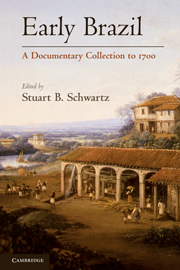Book contents
- Frontmatter
- Contents
- Preface
- A Note on Translation
- A Note on Portuguese Currency, Weights, and Measures
- Maps
- 1 The “Discovery” and First Encounters with Brazil
- 2 The Donatarial System
- 3 Royal Government
- 4 The French Interlude
- 5 Indians, Jesuits, and Colonists
- 6 The World of the Engenhos
- 7 Government and Society in Dutch Brazil
- 8 Burdens of Slavery and Race
- 9 Public and Private Power
- 10 Religion and Society
- 11 Frontiers
- Index
4 - The French Interlude
Published online by Cambridge University Press: 05 June 2012
- Frontmatter
- Contents
- Preface
- A Note on Translation
- A Note on Portuguese Currency, Weights, and Measures
- Maps
- 1 The “Discovery” and First Encounters with Brazil
- 2 The Donatarial System
- 3 Royal Government
- 4 The French Interlude
- 5 Indians, Jesuits, and Colonists
- 6 The World of the Engenhos
- 7 Government and Society in Dutch Brazil
- 8 Burdens of Slavery and Race
- 9 Public and Private Power
- 10 Religion and Society
- 11 Frontiers
- Index
Summary
The Portuguese had been troubled by the presence of French ships on the coast throughout the first half of the sixteenth century. The competition for dyewood lay at the heart of the rivalry, and both the French and the Portuguese mobilized indigenous allies to attack their rivals. In 1555, the French established an outpost at Fort Coligny on an island in Guanabara Bay. Although the colony established good relations with the local indigenous population, eventually squabbling between its Huegenot and Catholic members and the authoritarian rule of its leader, Nicholas Durand de Villegagnon, weakened the colony. The Portuguese destroyed the colony in 1560 and established their own settlement, São Sebastião do Rio de Janeiro on the shores of Guanabara Bay, in 1563. In the following letter, the seriousness of the French threat is made clear.
Letter from Francisco Portocarrero to King John III Concerning the Abuses Committed by the French in Bahia, the Maladministration of the Governor-General, Dom Duarte da Costa, and the Presence of Pirates at Rio de Janeiro
(From História da Colonização Portuguesa do Brasil, vol. III, p. 377.)
- Type
- Chapter
- Information
- Early BrazilA Documentary Collection to 1700, pp. 101 - 116Publisher: Cambridge University PressPrint publication year: 2009



